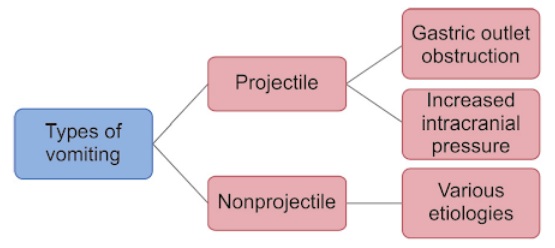Vomiting can be defined as the involuntary and forceful expulsion of gastric contents through the mouth and sometimes the nose. Medically, it is called emesis and among other terms, vomiting is also called puking, barfing and throwing up. In this article, we are going to discuss the difference between projectile and non-projectile vomiting and also their causes. We hope that you find this blog post helpful! 🙂
If you are a medical student who is taking clinical rotations then you must have come across these two terminologies especially while documenting the medical history of a patient with a gastrointestinal ailment. Our first impression is almost always confusing these two terms with college Physics (as the name suggests) 😀 . But physics has really nothing to do with the projectile and non-projectile vomiting. Read on and you will understand why! 😀

What is Projectile Vomiting?
It is basically a type of severe vomiting in which the contents of the stomach are forcefully expelled out several feet away from the individual. It can be so forceful that some of the food particles may exit through the nose because there is more force behind the emesis. There is no preceding nausea in the projectile vomiting. It is more severe, forceful and the vomitus travels.
Here’s what projectile vomiting looks like:
Causes of Projectile Vomiting
Below are a few important causes of projectile vomiting:
- Infantile hypertrophic pyloric stenosis
- Raised intracranial pressure
- Gastric outlet obstruction
What is Non-Projectile Vomiting?
Vomiting accompanied by nausea is called non-projectile vomiting. The individual is more likely to feel nauseous for a while (the classical warning sign of non-projectile vomiting). It is less severe, less forceful and the vomitus does not travel (usually falls on the individual’s own clothes).
Here’s what non-projectile vomiting looks like: 😀

Causes of Non-Projectile Vomiting
Below are a few important causes of non-projectile vomiting:
- Heat stroke
- Sickness during pregnancy
- GERD
- Esophagitis
- Immediate reflux as a result of food or medicine intake
That’s all. We hope that you people find this article useful! 🙂
Want to add to this blog post? You may do so by using the comment box below! 🙂



![AIDS Defining Conditions Mnemonic with their CD4 Count [High-Yield] AIDS Defining Conditions Mnemonic](https://www.medicosrepublic.com/wp-content/uploads/2023/08/AIDS-Defining-Conditions-Mnemonic-with-CD4-Count-218x150.jpg)
![Erythema Multiforme vs Erythema Migrans [High-yield Notes] Erythema Multiforme vs Erythema Migrans](https://www.medicosrepublic.com/wp-content/uploads/2023/08/Erythema-Multiforme-vs-Erythema-Migrans-High-yield-Notes-218x150.jpg)
![Medical Terminology: The Best and Most Effective Way to Memorize, Pronounce and Understand Medical Terms 2nd Edition PDF Free Download [Direct Link] Medical Terminology The Best and Most Effective Way to Memorize, Pronounce and Understand Medical Terms 2nd Edition PDF](https://www.medicosrepublic.com/wp-content/uploads/2022/11/Medical-Terminology-The-Best-and-Most-Effective-Way-to-Memorize-Pronounce-and-Understand-Medical-Terms-2nd-Edition-PDF-Free-Download-218x150.jpg)
![Pharmaceutical Emulsions: A Drug Developer’s Toolbag 1st Edition PDF Free Download [Direct Link] Pharmaceutical Emulsions A Drug Developer's Toolbag 1st Edition PDF](https://www.medicosrepublic.com/wp-content/uploads/2022/12/Pharmaceutical-Emulsions-A-Drug-Developers-Toolbag-1st-Edition-PDF-Free-Download-150x150.jpg)
![The Heart in Systemic Autoimmune Diseases Volume 14, 2nd Edition PDF Free Download [Direct Link]](https://www.medicosrepublic.com/wp-content/uploads/2018/12/The-Heart-in-Systemic-Autoimmune-Diseases-2nd-Edition-PDF-Free-Download-150x150.jpg)

![Hacking Wireless Networks For Dummies PDF Free Download [Direct Link]](https://www.medicosrepublic.com/wp-content/uploads/2023/02/Hacking-Wireless-Networks-For-Dummies-PDF-150x150.jpg)
![Musculoskeletal Trauma in the Elderly 1st Edition PDF Free Download [Direct Link] Musculoskeletal Trauma in the Elderly 1st Edition PDF](https://www.medicosrepublic.com/wp-content/uploads/2022/11/Musculoskeletal-Trauma-in-the-Elderly-1st-Edition-PDF-Free-Download-150x150.jpg)
![Pocket Medicine 8th Edition PDF Free Download [Direct Link]](https://www.medicosrepublic.com/wp-content/uploads/2023/01/Pocket-Medicine-8th-Edition-PDF-Free-Download-150x150.jpg)
![Nursing Mnemonics PDF Free Download [Direct Link] Nursing Mnemonics PDF](https://www.medicosrepublic.com/wp-content/uploads/2023/04/Nursing-Mnemonics-PDF-Free-150x150.jpg)
![Head, Neck, and Orofacial Infections: An Interdisciplinary Approach 1st Edition PDF Free Download [Direct Link] Head, Neck, and Orofacial Infections An Interdisciplinary Approach 1st Edition PDF](https://www.medicosrepublic.com/wp-content/uploads/2023/07/Head-Neck-and-Orofacial-Infections-An-Interdisciplinary-Approach-1st-Edition-PDF-Free-Download-1-150x150.jpg)
![Coloring Atlas of the Human Body PDF Free Download [Direct Link]](https://www.medicosrepublic.com/wp-content/uploads/2023/01/Coloring-Atlas-of-the-Human-Body-PDF-Free-Download-150x150.jpg)
![Endoscopic Craniosynostosis Surgery: An Illustrated Guide to Endoscopic Techniques 1st Edition PDF Free Download [Direct Link] Endoscopic Craniosynostosis Surgery: An Illustrated Guide to Endoscopic Techniques 1st Edition PDF](https://www.medicosrepublic.com/wp-content/uploads/2023/03/Endoscopic-Craniosynostosis-Surgery-An-Illustrated-Guide-to-Endoscopic-Techniques-1st-Edition-PDF-Free-150x150.jpg)





Thank you. This really helped.
Can you please tell me the source of these definitions?